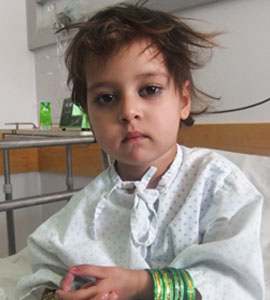 Pneumonia remains a primary killer of children under five in developing countries. In Khushi’s case, not only was she struck with pneumonia, she was suffering from a type that was difficult to treat. Whereas other children recover from pneumonia in two weeks, she stayed at FMIC for 35 days bravely fighting for her life.
Pneumonia remains a primary killer of children under five in developing countries. In Khushi’s case, not only was she struck with pneumonia, she was suffering from a type that was difficult to treat. Whereas other children recover from pneumonia in two weeks, she stayed at FMIC for 35 days bravely fighting for her life.
“She kept coughing and at times it looked like she could not breathe,” recalled Mohammad Amin, a labourer, of his two-and-a-half-year-old daughter Khushi.
“She was very warm and feverish, and her lips were strangely coloured. We had already spent two days at the public hospital in Mazar-e-Sharif where she was given strong medicines, but when they felt that they could not help her, they sent us here,” he added.
“Here” was the French Medical Institute for Mothers and Children in Kabul, nearly a five-hour journey from Mazar-e-Sharif, Afghanistan’s fourth largest city, in the northern province of Balkh.
“Khushi was in a terrible condition when we first received her,” said Dr Wahid Sabet, the paediatrician who treated her, “she was pale, weak and had a very high fever. But we were most concerned about her breathing – she was really labouring to breathe. We suspected pneumonia due to staph infection and began treatment immediately.”
Khushi’s father now aspires to send her to school: “I want my daughter to become a doctor one day so that she too can serve those in need, especially children.”
A chest x-ray confirmed the doctor’s worst fear: an infection in both her lungs with only a small area helping her breathe. She had arrived just in time.
Unable to breathe independently, Khushi was hooked to a ventilator, given strong antibiotics and provided with supportive care, including chest physiotherapy.
A couple of days later, the staph infection was confirmed; staphylococcus aureus, a bacterium usually found on the skin can cause a serious and often fatal infection once it enters the body.
Khushi’s condition, staph pneumonia, was even rare; on average FMIC, only receives six cases a year.
The next five weeks were crucial to Khushi’s recovery. Through a joint effort by a medical team of doctors, nurses and administrative staff, Khushi was slowly nursed back to health.
As time passed, her staph infection was regulated, her fever dropped, her appetite returned and her general condition improved. She was eventually able to eat unassisted and finally, after weeks of struggle, she was able to walk by herself. Her chest x-ray, usually the last to return to normal, showed significant improvement.
Thirty-five days after having been admitted, Khushi was finally discharged from FMIC.
Relieved and thankful that she survived against the odds, Khushi’s father now aspires to send her to school. His dream is that his daughter will one day become a doctor so that she too can serve those in need, especially children.
FMIC in Afghanistan
Like Khushi, many children fall prey to rare diseases in Afghanistan. This is not unusual for a country where half of all Afghan children die before they reach the age of five, one-third die soon after birth and over half within the first year of their life.
FMIC caters to the needs of infants, children and young adults in Afghanistan, including those who suffer from life-threatening conditions. In its six years, FMIC’s welfare programe has, so far, spent approximately over US$ 39 million on patients.